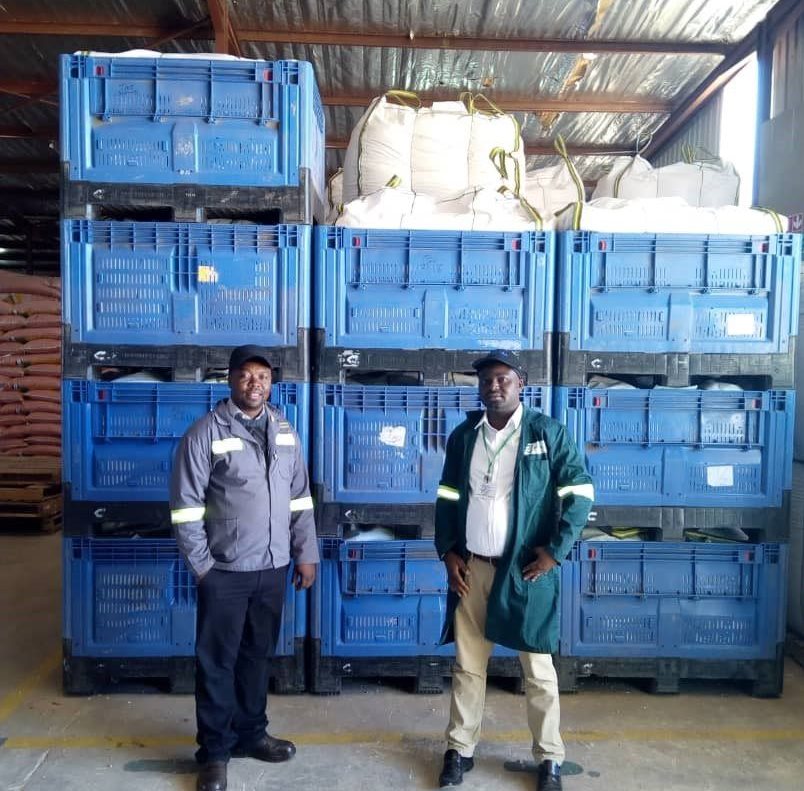Syngenta, Chep cultivate seeds of success in Zambia

Syngenta (also known as MRI Seed) is a company that provides innovative crop solutions for millions of growers, offering a wide range of field crops, vegetable and flower seeds, as well as agrochemicals.
The challenge
Initially, Syngenta in Zambia would purchase and maintain its own pool of pallets for storing bulk seeds and transporting the seeds to clients, once they had been placed in smaller pack sizes.
"Our seeds are stored in packing units of two, five, 10 or 25kg bags for finished products, and in 50, 500 or 1,000kg bags for raw material," said Eric Gatignol, production lead for Syngenta Zambia. "We lacked good pallets and had limited storage capacity, so we were forced to stack jumbo bags. This made it difficult to ensure worker safety and comply with HSE Standards. Housekeeping too was more difficult and inventory counts were tedious and inaccurate due to the stacking."
At the time, Sygenta outsourced their pallet repairs. But the quality of the repairs was sub-standard, which resulted in major product and packaging damage. With bulk seeds sometimes being stacked in 1-ton jumbo bags, three high, on sub-standard pallets, there was a definite need for a better solution.
The solution
For assistance, MRI Seed approached Chep, which specialises in managing, maintaining, transporting and supplying of efficient, sustainable product loads via more than 350 million logistics platforms for customers globally.
"After careful consultation with the customer, we proposed a solution that consists of a 500kg bulk bin bag, fitting snugly into a bulk bin,” said Muchie Sarari, business unit manager for Chep Zambia. "The bulk bins can be stacked six high and proved a completely stable solution, which addressed the company’s safety concerns."
The customised bags feature a spout sewn into the bottom of the bulk bin bag to allow for easy discharge of seed. This simple solution immediately eliminated the need for additional handling equipment, as bags no longer need to be tilted to facilitate discharge. The design of the bins also allows for more effective fumigation than before, resulting in fewer losses.
"Besides providing pallets, we suggested Syngenta use plastic bins to improve storage capacity and safety," said Sarari. "We also provided an on-line system that allows the company to track pallet movements across their network."
MRI Seed further opted to use Chep pallets to store seeds in smaller pack sizes.
Previously using their own sub-standard pallet pool, MRI Seed had no option but to load trucks manually, which meant that one truck could take up to half a day to load. Thanks to the Chep pallets, it now takes a mere 45 minutes to load a truck.
The benefits of a Chep solution
Gatignol said that the change was so successful, that the Syngenta teams were requesting more bins and asking that all storage capacity be converted to the same solution.
"We are proud of our new environment, and it’s great to see the warehouses so well organised and clean. Our storage capacity has also increased significantly," said Gatignol.
For phase one of the project, MRI Seed have signed a three-year contract with Chep for the use of 3,000 bulk bins and 4,500 pallets on a static basis. Negotiations are underway to make a further 5 000 bulk bins available at some of the company’s other warehousing sites.
"The Chep team has been really supportive, even finding solutions outside of their direct scope of activity," said Gatignol. "We would definitely recommend Chep, especially across the seeds supply chain in Zambia. If the entire community were to use the same solution, it would help reduce costs, waste and fuel consumption and benefit our final customer – the farmers."
Related
Telkom, partners introduce smart agritech, transforming SA wine 14 Mar 2025 FarmRanger app secures 2024 FNB top agricultural award 17 Dec 2024 North-West University at the forefront of agricultural innovation 9 Dec 2024 African Agri Investment Indaba drives solutions for Africa’s growing food crisis 19 Nov 2024 African Agri Investment Indaba to connect investors with $1bn in agri projects 15 Nov 2024 2024 GoGettaz Agripreneur finalists announced 5 Aug 2024























